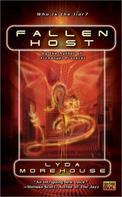
| Series: | AngeLINK #2 |
| Publisher: | Roc |
| Copyright: | May 2002 |
| ISBN: | 0-451-45879-6 |
| Format: | Mass market |
| Pages: | 339 |
Fallen Host is the sequel to Archangel Protocol, but it stands on its own reasonably well. Both the world and recurring characters are reintroduced for unfamiliar readers, and the focus of this book is significantly different than the previous book. I recommend reading them in order for the world background and character introductions, though, since there are a lot of back-references that gain more depth by reading the previous book first.
Here, Morehouse shifts away from the urban fantasy feel of Archangel Protocol and towards a more traditional cyberpunk setting, albeit with angels and a bit of eschatology layered on and following the haves more than the have nots. Morningstar and Page return, as central characters this time, and are joined by an Inquisitor, who in Morehouse's semi-post-apocalyptic religious future have taken over all international policing duties from such groups as Interpol. Emmaline serves the Pope because all Inquisitors were put under Roman Catholic authority, but she's an American Catholic, which in this world means a much more liberal attitude towards sexuality and related topics. She's not a particularly good priest, but she is an excellent Inquisitor, not to mention an effective combat cyborg.
Emmaline provides most of the plot impetus for this story. Her assignment is to determine whether AIs have souls, and the course of that investigation entangles her in the fallout from Archangel Protocol, particularly Page's reactions to its aftermath. She's not a subtle investigator, but she has past experience with wire wizards and the cyberpunk world (not that it's called that) and was therefore the only available choice. (Although there may be other forces at work, either sinister or divine.)
Fallen Host is a bit more polished, and a bit stronger on forward-moving plot, than Archangel Protocol, but it still struck me as a weaker book. Something about the presentation of the characters and the plot felt strangely forced to me. It never quite gels. There's a bit too much telling rather than showing, a bit too much of Page's and Emmaline's angst, and a bit too much of pushing in the reader's face how much certain characters are badasses. I also badly missed the chapter-ending news articles or personal letters that in Archangel Protocol did much of the heavy lifting in building the world. I enjoyed reading Fallen Host, and became quite engrossed with some scenes, but throughout I felt like the book was missing a beat. Partly, I think that's because both Morningstar and Emmaline are only occasionally likeable, and Page spends a lot of the book in a frustrating funk, so it's a bit hard to find a protagonist one likes.
The supporting characters, however, shine. Once again, Morehouse shows a real knack for building memorable, fascinating characters around the plot. This time, I think the best is the Dragon of the East, the other recognized AI in this world besides Page. She's an AI designed by the Yakuza (with a bit of entirely off-screen child semi-abuse involved), with quite a bit more processor power available than Page, but with a child-like and delightful perspective on the world. The interactions between her and Page are beautiful and for me were the highlight of the book.
Also playing a significant role, and grabbing a lot of reader attention, is Mai, a cello player for a thrash polka band who was also one of the creators of the Dragon of the East. She's woven throughout the story, showing some child-like similarities to the Dragon mingled with hippie rock band impracticality layered over a sort of resourceful practicality. I liked how Mai and the Dragon echoed each other, and how the link between them is clear and present even though it rarely receives any direct attention.
I think one's enjoyment of this book will depend on how much one engages with the characters, and I think the secondary characters will have the most appeal. The cyberpunk plot is okay, and Morehouse continues to handle angels well, but it feels a bit forced and a bit heavy on the stereotypes. The mafia, the secret police, the AI soul debate, the AI with the more powerful computer, the hippie rock band wasted on drugs, the screaming rock fans... sometimes it feels like story components were pulled off of a shelf. The world-building, apart from the strong core idea of merging angels, eschatology, and cyberpunk, isn't going to win prizes for originality. But for me the supporting cast made the story and drew me in.
Recommended still, although different fare from the first book.
Followed by Messiah Node.
Reviewed: 2010-10-10